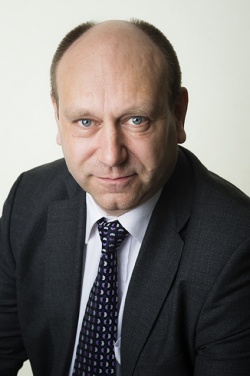Managing Director's Report
 The World Meteorological Organisation issued its annual climate statement last November. WMO's Finnish secretary general, Petteri Taalas, stated that “the past three years have been the warmest in the history of temperature measurement”.
The World Meteorological Organisation issued its annual climate statement last November. WMO's Finnish secretary general, Petteri Taalas, stated that “the past three years have been the warmest in the history of temperature measurement”.
We have seen extraordinary weather conditions: temperatures in Asia above 50°, unprecedented Caribbean hurricanes and, in Africa, harsh drought alternating with devastating floods.
Petteri Taalas, who is from Finland, knows what he’s talking about, but is anyone listening?
Last summer the world’s richest country, the United States, announced its withdrawal from the Paris Climate Accord. Time will tell what this decision ultimately means but it can hardly be good for combating climate change.
On the positive side, it seems to have inspired other countries to redouble their efforts. Europe, China and India may now take more responsibility for global warming. It is to be hoped that individual enterprises, territories and regional players will do the same.
Finance to help developing countries switch from fossil fuels is still well short of the 100 billion US dollars promised. This is paradoxical because climate measures will not help the developing countries alone. To a very great extent they will benefit rich countries too.
We should not be asking whether we can afford to participate. The real question is whether we can afford not to. The clock is ticking.
On a trip to Nigeria last November I encountered an astonishing statistic; more children are being born there than in the whole European Union: seven million in Nigeria compared with five million in the EU.
In poor countries children are often the only way of planning for old age. Where infant mortality is high, a good plan is to have many.
Every family on earth has the right to children if they freely want them. Europeans have no veto on the size of Nigerian families. But we can share a concern about where Africa’s fast-growing population will be schooled, where it will earn its livelihood, and how it will obtain electricity and other prerequisites for a good life.
I’m pleased to say that Finland is taking a stronger interest in Africa. People are starting to see how closely the futures of Europe and Africa are intertwined. This is a good thing but we urgently need to move on from words to deeds. The time for speeches is ending.
Global challenges require private investments
Finnfund’s mission, defined in our updated strategy, is to create a better world by financing responsible private business operations in developing countries. Our vision for 2025 is to be a respected partner and an influential pioneer in European development finance.
We constantly seek to do more, and to do it better than before. Finnfund finance is increasingly targeted at poor and fragile countries, the places where important investments depend on it.
Last year we granted additional funding for Mobisol, operating in Tanzania, Rwanda and Kenya, which uses solar energy to light homes and small workplaces, charge mobile phones, listen to the radio or watch television.
We also began to finance EthioChicken, a poultry production company creating employment, income and better nutrition in rural Ethiopia.
Additionally, Finnfund decided to finance solar power in southern Egypt. We are part of a consortium that will create the largest solar installation in Africa, producing electricity for up to a million Egyptians.
We prepared 29 projects last year, a record number, worth a total of 201 million euros. Almost a third of our financing decisions concerned Africa. Thirty percent of them were in countries classified by the OECD as fragile.
The poorest countries must not be neglected, despite the greater risks
It makes sense for a financial institution like Finnfund to focus on the poorest countries because this is where the development impact is greatest. However, it is not easy to operate in countries that are fragile with respect to democracy or human rights. There is a risk that, despite one’s best efforts, something will go wrong. Unfortunately, from time to time it does.
The simplistic response would be to stay away but then those countries would be deprived of clean energy, proper jobs and other development impacts. We cannot neglect them and so we intend to concentrate on doing things better than before.
Finnfund is steadily developing its methods and accountability. This is why we have reinforced our assessment of the development impacts of investments. Accordingly, we are being explicit about theories of change, the chains of development causality that we want to exploit in various sectors.
We have been reshaping our policies on taxation, initially by listening to representatives of civil society and other experts. We are currently working on human rights guidelines.
The challenges faced – above all in climate change, poverty and population growth – are so vast that a greater effort than ever is needed from everyone: national governments, civic organisations and enterprises.
People in need cannot wait: acute challenges deserve a rapid response. We have mutual agreement on what sustainable development should achieve. Technology can provide new sustainable solutions. The biggest shortfalls are in finance and the will to do more. I firmly believe we will start to see greater determination and thereby increased financial resources.
I would like to thank Finnfund’s customers, staff and other stakeholders for their support in 2017.
Jaakko Kangasniemi
CEO

